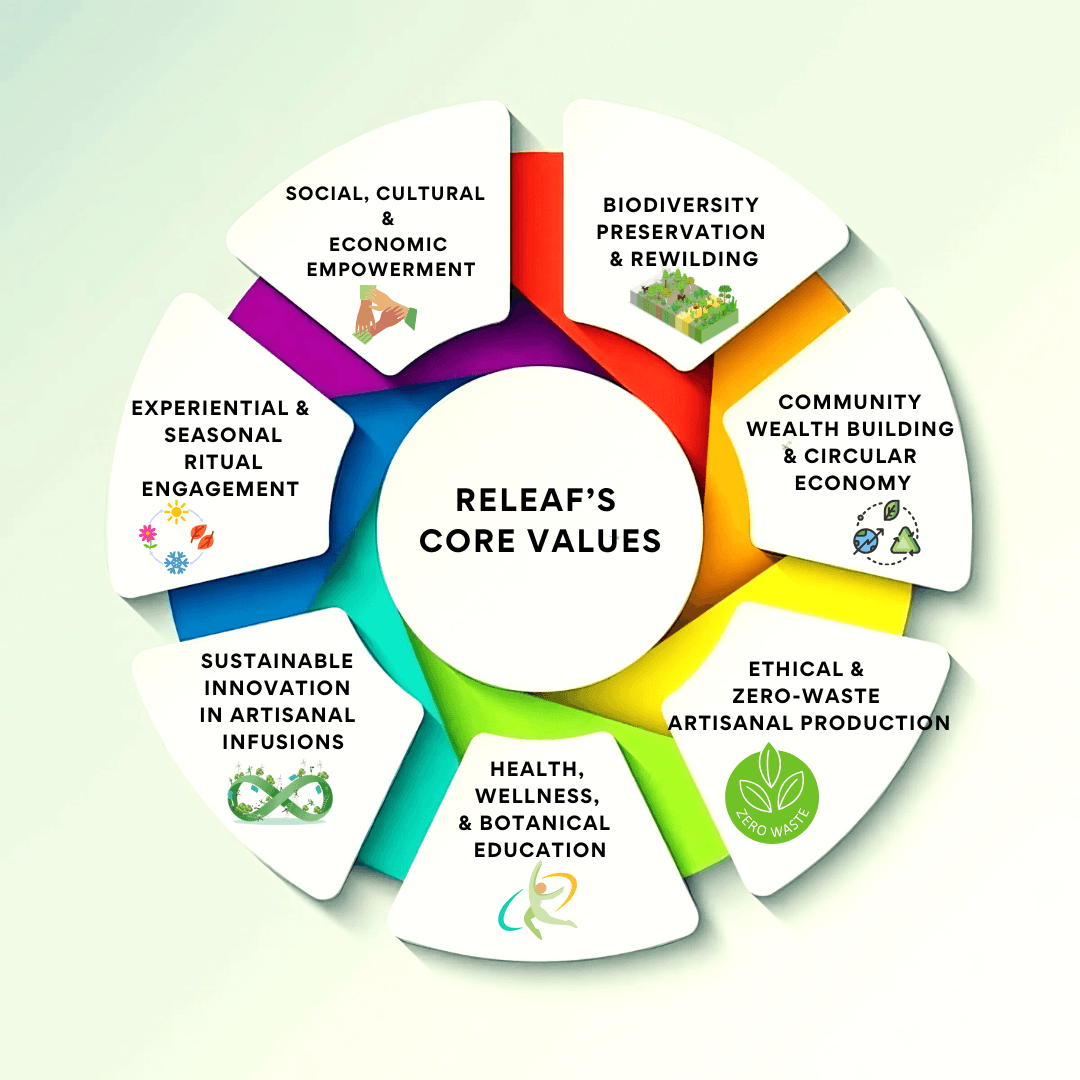ReLeaf Circular Hubs
Community-Driven Circular Economy for Regenerative Tea & Botanical Culture
Our Mission
ReLeaf Circular Hubs are localised centres for regenerative tea and botanical culture that prioritise biodiversity, cultural stewardship, ethical trade, and zero-waste innovation. Grounded in ancestral knowledge and community-led design, each hub nurtures a self-sustaining ecosystem where tea becomes a tool for education, ecological restoration, and economic justice.
Core Values:
- Biodiversity Preservation & Rewilding
- Community Wealth Building & Circular Economy
- Ethical & Zero-Waste Artisanal Production
- Health, Wellness & Botanical Education
- Sustainable Innovation in Artisanal Infusions
- Experiential & Seasonal Ritual Engagement
- Social, Cultural & Economic Empowerment

ReLeaf Circular Economy Framework
Our circular economy framework creates a regenerative ecosystem where tea and botanicals flow through a closed-loop system. This model ensures resources are maximised, waste is minimised, and communities thrive through sustainable practices and knowledge sharing. The framework integrates traditional wisdom with modern innovation to create resilient, community-centred hubs that honor both people and planet.
Each element of our framework reinforces the others, creating a self-sustaining system that generates ecological, social, and economic value. By connecting cultivation with consumption, education with entrepreneurship, and tradition with innovation, we've designed a model that can adapt to local contexts while maintaining core regenerative principles.

1. Regenerative Tea Farming & Seed Sovereignty
- Establish biodiverse tea and botanical gardens, including native, medicinal, and rare plants.
- Community-run seed banks protecting heritage plant varieties.
- Urban microfarms & Urban microfarms and rooftop gardens promoting food and infusion sovereignty.
- Public education on cultivating and harvesting personal tea plants.
2. Zero-Waste & Upcycled Innovation
- Compostable, refillable, and reusable packaging models.
- Upcycling of botanical waste into:
- Natural cleaners and potpourri fibres
- Tea-infused candles and art supplies
- Pet care and skincare products
- Textile and paper crafts from plant
3. Tech-Enabled Tea & Botanical Experience
- Smart brewing tools for optimal extraction.
- Audio-guided tea and ritual experiences for blind or neurodiverse participants.
- AI-assisted plant identification for education and sourcing integrity.
4. Community Engagement & Global Learning
- Workshops on land stewardship, tea blending, and ecological literacy.
- School and youth programmes promoting environmental connection.
- Cultural exchange trips to study regenerative rituals in diverse communities.
- Events integrating traditional stories, spiritual practices, and seasonal folklore.
5. Personalisation & Specialty Blends
- Customisable tea subscriptions aligned with well-being needs.
- Botanical infusions supporting cognitive, emotional, and physical health, e.g., men's wellness, menopause care, stress relief, sleep support.
- Culinary applications: tea seasonings for stews, marinades, and desserts.
6. Ethical Partnerships & Circular Commerce
- Partnerships with eco-conscious producers and retailers (e.g., Waterstones, hotels, cafés).
- Corporate and community wellness collaborations across diverse sectors.
- Tea-based gifting, seasonal bundles, and employee well-being initiatives.
- Sustainable branding materials and business cards.
7. Inclusive Empowerment & Local Economy
- Support for inclusive cooperatives, across age, gender, and ability.
- Fair wage systems and reinvestment in local education, health, and ecology.
- Mentorship and training for marginalised herbalists and land stewards.
8. Tea-Infused Merchandise
- Wellness and sensory products: soaps, bath salts, candles
- Tea journals, calendars, and slow-living planners
- Artisan teapots and brewing tools with cultural design motifs
- Eco-fashion: herbal-dyed textiles and accessories
Our Circular Model at a Glance
- Grow → Local cultivation of native and medicinal plants
- Harvest → Ethical natural ingredients
- Produce → Zero-waste packaging, community-owned facilities.
- Distribute → Return-and-refill models and hub-based sales
- Experience → Ritual-based education, events, and workshops
- Compost & Reuse → Closed-loop systems for soil regeneration
Commitment to Regeneration & Inclusion
ReLeaf operates with the 9Rs of the Circular Economy (Refuse, Rethink, Reduce, Reuse, Repair, Refurbish, Remanufacture, Repurpose, Recycle) while uplifting ancestral knowledge systems and designing for accessibility, equity, and long-term resilience. empowerment.
Be Part of the Circular Ritual
ReLeaf welcomes changemakers, educators, farmers, artists, and everyday stewards of botanical traditions to help shape a future where every sip, from leaf to root, regenerates the earth, empowers community, and honours the sacred rhythm of giving and recieving.